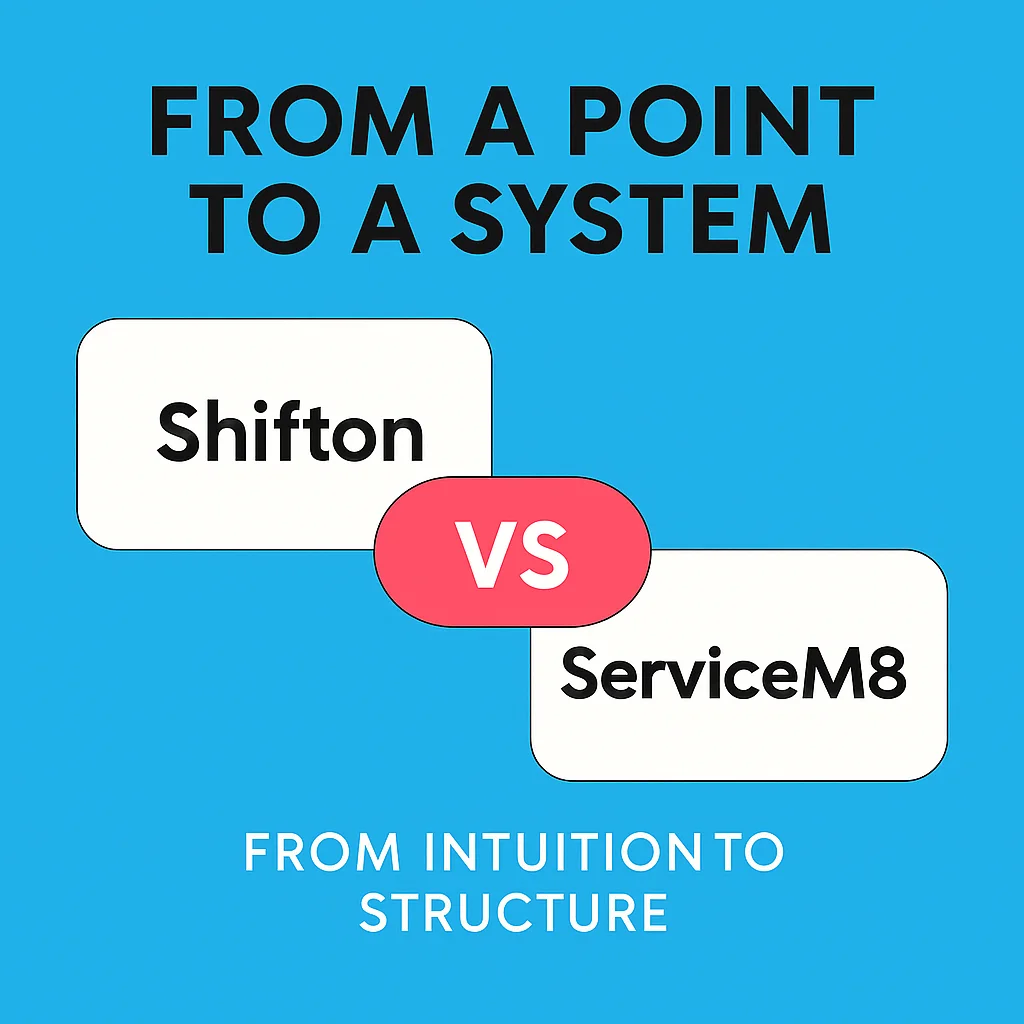Shifton vs ServiceM8: Roles and Responsibility
Small businesses often start with a phone. The first client, the first calendar note, the first visit. At that stage, a mobile app like ServiceM8 is enough — simple, visual, and lightweight. But over time, tasks multiply. Employees appear, branches open, reports are needed, and accountability becomes essential. Intuition turns into the need for structure. That’s when Shifton Field Service enters the stage — not just an app, but an entire ecosystem for managing field operations. It doesn’t replace mobility — it adds meaning.

Product Philosophy
ServiceM8 is built on minimalism: minimal fields, maximum speed. Task, route, client, photo — everything works simply. The problem is, the system exists in one dimension.
Shifton thinks in layers: each task isn’t just a route, but also a status, checklist, time, assignee, client, materials, and result. Everything is interconnected and stored in a structure where every point is visible.
ServiceM8 shows where you are.
Shifton shows how the entire team works.
Scale and Levels
ServiceM8 is perfect for companies with up to 10–15 people. But once a second team appears or parallel tasks begin — the system starts to limit growth.
Shifton was created for scaling. It doesn’t fear expansion — there’s no wall to hit. Add another zone, branch, city, or country — the interface stays simple, and the logic remains intact.
Shifton vs ServiceM8: Service Areas
ServiceM8 works with client addresses but not with territories.
Shifton builds Service Areas — flexible geographic zones, each managed by its own team. On the map, you can see everything: who’s on the way, who’s on-site, and who’s free for the next call. It’s not just a geo feature — it’s a tool for balancing workload and optimizing operations.
Task Management
In ServiceM8, everything revolves around “done and marked.”
In Shifton, every task has a life of its own — with:
-
statuses (from “assigned” to “completed”),
-
checklists,
-
execution time,
-
photos and signatures,
-
comments and history logs.
Shifton turns the workflow into a controlled, visible process.
Analytics
ServiceM8 provides simple statistics — number of tasks, paid jobs, completed visits.
Shifton goes deeper — turning numbers into insights and actions. It’s not reporting for the sake of reporting — it’s a tool for managing quality and performance.
Shifton vs ServiceM8: Roles and Responsibility
ServiceM8 operates with two roles: administrator and technician.
Shifton introduces structure:
-
Company Owner,
-
Administrators,
-
Approvers,
-
Requesters,
-
Technicians.
This architecture makes processes transparent — you always know who created, approved, performed, and verified each task.
Integrations
ServiceM8 offers basic integrations with email and calendars.
Shifton is open to the world — CRM, ERP, accounting systems, cloud platforms, API, Zapier. Integrations aren’t add-ons — they’re embedded parts of the ecosystem.
Support and Growth
ServiceM8 updates rarely — prioritizing stability.
Shifton evolves constantly, with short release cycles where every new feature comes from real user feedback. Shifton’s support isn’t just a department — it’s a partner. The team responds fast and helps you not just close a ticket, but improve a process.
User Experience
ServiceM8 looks nice, but its interface is built for a solo operator.
Shifton is designed around shared visibility — everyone sees what they need, depending on their role. It’s friendly, yet scalable.
Why Shifton
Because ServiceM8 is where the journey begins — but Shifton is where that journey becomes a system. It keeps mobility, but adds structure. It helps you grow without breaking habits.

 English
English  Español
Español  Português
Português  Deutsch
Deutsch  Français
Français  Italiano
Italiano  日本語
日本語  中文
中文  हिन्दी
हिन्दी  עברית
עברית  العربية
العربية  한국어
한국어  Nederlands
Nederlands  Polski
Polski  Türkçe
Türkçe  Українська
Українська  Русский
Русский  Magyar
Magyar  Română
Română  Български
Български  Čeština
Čeština  Ελληνικά
Ελληνικά  Svenska
Svenska  Dansk
Dansk  Norsk
Norsk  Suomi
Suomi  Bahasa
Bahasa  Tiếng Việt
Tiếng Việt  Tagalog
Tagalog  ไทย
ไทย  Latviešu
Latviešu  Lietuvių
Lietuvių  Eesti
Eesti  Slovenčina
Slovenčina  Slovenščina
Slovenščina  Hrvatski
Hrvatski  Македонски
Македонски  Қазақ
Қазақ  Azərbaycan
Azərbaycan  Afrikaans
Afrikaans  বাংলা
বাংলা